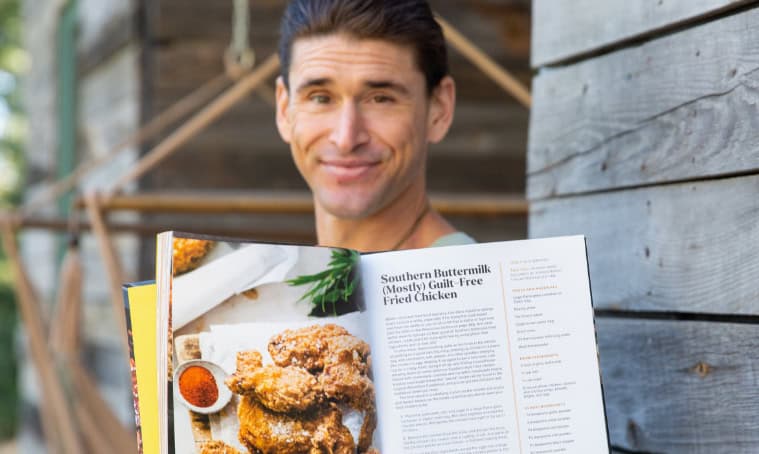March 19, 2016
Click here for the full written transcript of this podcast episode.
Did Lindsey Lohan really get drunk on kombucha?
How much caffeine and sugar is in kombucha?
Can you eat that slimy scoby thing that floats to the top?
How can you make kombucha more “bubbly” if you're making it yourself?
Can kombucha be used for things other than just drinking?
Is it safe to mix kombucha with cocktails or (as I do) to top it off with a bit of vodka now and then?
We're going to tackle all these topics and much more in today's interview with Hannah Crum, author of the brand new title “The Big Book of Kombucha: Brewing, Flavoring, and Enjoying the Health Benefits of Fermented Tea“.
Hannah joined me last year for the podcast episode “Kombucha: Everything You’ve Always Wanted To Know But Were Afraid To Ask.“, but since then, she's written the quintessential guide to all things kombucha, and what I would consider to be the #1 resource for anybody who wants to know everything there is to know about kombucha.
With more than 400 recipes, including 268 unique flavor combinations, you can get exactly the taste you want — for a fraction of the store-bought price. This complete guide shows you how to do it from start to finish, with illustrated step-by-step instructions and troubleshooting tips. The book also includes information on the many health benefits of kombucha, fascinating details of the drink’s history, and recipes for delicious foods and drinks you can make with kombucha (including some irresistible cocktails!).
Hannah Crum is known as The Kombucha Mamma, and is founder of Kombucha Kamp, the most visited website in the world for Kombucha information, recipes and advice. Hannah is also an industry journalist & Master Brewer, directly mentoring thousands of new and experienced Kombucha brewers and providing consultation services for Kombucha start-ups since 2007.
Hannah is also a leader and featured speaker in the Southern California Real Food movement, using the “Kombucha Lifestyle” as an introduction to other fermented foods, gut health, the human microbiome, “bacteriosapiens” and more. She ships freshly grown, full-size Kombucha starter cultures to more than 10,000 people worldwide and offers kits and Continuous Brew Packages, the ultimate in convenient homebrewed Kombucha, via her webstore.
During our discussion, you'll discover:
Resources from this episode:
Get Your Free Kombucha DIY Guide & E-book Here
Link to Hannah's kombucha book tour & dates
Do you have questions, comments or feedback for Hanna or I about the Big Book of Kombucha or anything else we discuss in this episode? Leave your thoughts below and one of us will reply!














As a bit of a curmudgeon, I’m often reluctant to try new things. Here on the Gulf Coast, I wouldn’t even know what Kombucha is, let alone know where to get it.
Well, I after having heard this podcast, I got to thinking about the different types of macrobiotics in my diet – which seem to primarily stem from Costco’s store brand, Kirkland’s Greek Yogurt. So, on a lark, I got some of this Kombucha that was Organic and allegedly flavored with lemon.
I know that different manufacturers recipes will differ – but who would enjoy drinking this stuff? It was not just bad, it was awful.
Is this an acquired taste like beer? Is it supposed to taste like medicine?
I'd suggest trying to make it yourself. It is an acquired taste, but you can make your own taste however you like.
Hi! I love kombucha! Haven’t had the guts to make it myself yet so I normally stick to store bought. Is it safe to drink while pregnant/nursing? The bottle I typically buy says “may contain a trace amount of alcohol”.
Would the home stuff me safer? Or no?thanks!
Humans have been consuming low-alcohol traditionally fermented beverages in lieu of water for millenia. However, whether or not YOU should drink Kombucha is dependent on how it makes you feel – i.e. Trust YOUR gut.
If consuming it makes you feel good, then you are on the right track. If not, then refrain. More details can be found on p. 22-23 and here –> https://www.kombuchakamp.com/kombucha-tea-pregnan…
Hi Shana – thanks for asking. Just as there are many types of bacteria there are also many types of yeast. Kombucha contains known candida-cides and most find that after 2 weeks or so of a die off period, their bodies rebalance. However, you will need to consume Kombucha that’s sour – so if purchasing store bought – let it sit at room temp on your counter and sip daily until it tastes tangy. Or make your own at home! If its too intense, try milk kefir or coconut water kefir – we have both of those cultures for making it at home as well!
I just bought one of Hannah’s kombucha kits and it was incredibly simple. But now I’m drinking some in the morning and some at night as suggested but I’m also drinking baking soda with lemon and water and worry the properties in baking soda might be killing off some of the bacteria…should there be any concern?
A healthy body needs several types of nutritional inputs. Whenever anything is labeled as “antibacterial” the question that pops to mind is anti what TYPE of bacteria? Typically it refers to pathogenic organisms. The bacteria in Kombucha are probiotic and likely are not affected by the small amount of baking soda being consumed.
What about the sugar content? Is there any sugar left in the brew post-fermentation?
If so, does kombucha consumption comply with a ketogenic diet?
We cover all this here: https://bengreenfieldfitness.com/2015/01/kombu…
The book describes this in detail – p. 64
Kombucha is a yeast, correct? So if you are prone to candida, is it still recommended to drink homemade Kombucha?
Hi Shana. The yeast in Kombucha are different than those in candida. Kombucha contains known candida-cides such as phenethyl alcohol and caprylic acid. However, you do need to make sure its on the tangy side so the sugar is mostly consumed by the fermentation process. More details and a scientific study can be found on p.369
If we have to buy store bought, which one do you recommend?
we cover that in detail here: https://bengreenfieldfitness.com/2015/01/kombu…
Hi Ben, I’ve noticed my nipple’s looks puffy, and I was wondering if my way of doing CT has anything to do with it. I’m 21yrs old male and about 12-15% body fat judging by male body fat pic, and I haven’t had puffy nipple until lately, which correlate to me trying CT. The way I do it though, as where I live is hot, is to fill a foam box with water and then put in the frozen water bottles (which I then refreeze daily), leave it for 5-6 of hours for the whole thing to become cold, then during shower I get on all fours and dunk my upper half into it for maybe 40min daily. I feel completely great doing it. I wonder about my nips cos they get hard when exposed to cold (which is normal), but they were also sore to touch during the first times, and they continue to be so while they started to be puffy.
So I was wondering if freezing of my nips make them puffy?
If the foam box & plastic bottles leaches xenoestrogen compound (this case I can test and see if blood estrogen is elevated right)?
Or if doing CT just pushes my stress level further and mess up my overall hormones (as I had history of HPA axis, and while I feel great right after I can feel that it’s sometime make me more tired the next day when I overdo it, and stress hormones can also cause puffy nips right)?
Sorry it’s quite long, I’m worried about my nips lol, thanks Ben! :)
I'd start here: http://www.quickanddirtytips.com/health-fitness/e…
Thank you Ben, but the link doesn’t seem to be working, could you give me the name of that article so that I can search for it on quickanddirtytips instead?
try this: http://www.quickanddirtytips.com/health-fitness/e…